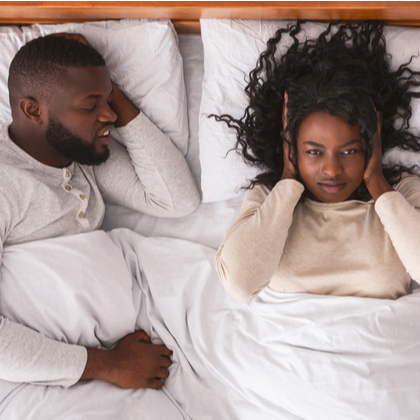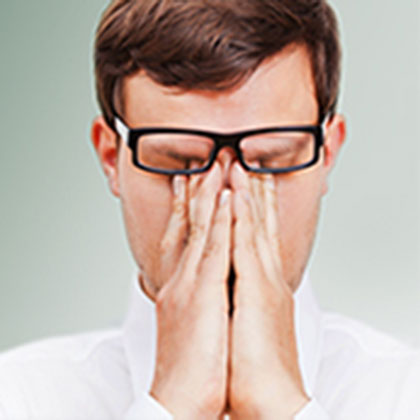
Most of us grind our teeth now and then to some extent or other – when we’re under a lot of stress, for example. However, more-than-occasional teeth grinding, and jaw clenching is a medical condition. Called bruxism, it’s a common problem – according to The Bruxism Association it affects around 8 - 10 per cent of the UK population, with those aged 25 - 44 the most likely to suffer from it (i).
One of the problems with bruxism is that many people don’t realise they’re doing it. But all that unconscious grinding and clenching can wear down your teeth gradually, rather than suddenly, which may explain why few people see their dentist about bruxism when the problem starts.
While you may not realise you’re grinding your teeth or clenching your jaw, you may experience the signs and symptoms of bruxism, which include:
-
Facial pain
-
Jaw pain and stiffness
-
Arthritis of the jaw
-
Shoulder tightness/stiffness
-
Tooth loss or sensitivity
-
Broken dental fillings, chipped or cracked teeth
-
Inflamed and/or receding gums
There are two types of bruxism. Awake bruxism is when you grind your teeth and clench your jaw during the daytime while you’re awake. Sleep bruxism, on the other hand, is when you have the problem at night while you’re sleeping, which can also cause disrupted sleep, not just for you but also your partner. Indeed, sleep bruxism is thought to be the most common type.
Sleep bruxism is classed as a sleep-related movement disorder, along with other conditions such as restless legs syndrome and periodic limb movements. If you have one or more of these disorders, you’re also more likely to be a snorer or experience sleep apnoea.
If your jaw joint and muscles are affected, bruxism can also sometimes lead to temporomandibular disorder (TMD), which affects the movement of the jaw. The two conditions share some similar symptoms, such as earache, facial pain, headache and jaw problems such as having difficulty chewing or your jaw locking when you open your mouth. According to the NHS, TMD isn’t usually serious and generally gets better on its own.
Who should you see?
Your dentist should be the first person you see if you notice any of the signs or symptoms of bruxism, such as having worn, damaged or sensitive teeth, facial or ear pain or if you have a sleep partner who says they’ve noticed you making a grinding sound at night.
If your dentist spots the signs of bruxism in your mouth or jaw, they can offer suitable treatments. Depending on what’s making you grind your teeth, you may also have to see your GP.
What causes bruxism?
Though it’s not always clear what’s behind it, there are several things that can cause bruxism. According to The Bruxism Association, 70 per cent of cases are caused by stress and anxiety (i). The association also suggests that the most significant factor associated with bruxism is job-related stress. Other stressful situations that have been linked with bruxism include exams, bereavement, marriage, divorce and moving to a new house. Your personality type may predispose you to a higher risk of having bruxism too, especially if you are competitive or tend to suppress feelings of anger and frustration, or if you have a lot of built-up nervous tension.
Meanwhile, stress isn’t the only emotional health issue thought to play a part in causing bruxism, with depression also thought to trigger it.
Other causes of bruxism include the following:
-
Medicines
According to the NHS some types of medication can cause teeth grinding, including a type of antidepressant called a selective serotonin reuptake inhibitor (SSRI). If you’re taking any medicines, read the patient information leaflet to find out about possible side effects. If a medicine you’re taking can possibly cause bruxism, see your GP, as an alternative medicine may be available that won’t cause the problem. -
Talking in your sleep
The NHS also suggests you’re more likely to grind your teeth if you talk or mumble during your sleep. Other sleep-related problems that can be linked to bruxism – besides snoring or sleep apnoea – are sleep paralysis (when you can’t move or speak while waking up or falling asleep) and kicking or punching violently while asleep. -
Alcohol
Teeth grinding is often worse after you’ve been drinking alcohol. This may be because alcohol can contribute to poor sleep, which is thought to be linked with bruxism. -
Smoking
Tobacco is a stimulant, which could explain why bruxism is more common in smokers than non-smokers. Similarly, recreational drugs that stimulate the central nervous system are associated with high rates of bruxism, including ecstasy and cocaine. -
Caffeine
If you drink a lot of caffeine – six or more cups a day – your risk of teeth grinding may be higher than normal. That’s because caffeine is a stimulant that promotes muscle activity and contributes to poor sleep.
Treatments for bruxism
If your dentist diagnoses you as having bruxism, they can provide you with a mouth guard or a mouth splint to prevent any further damage to your teeth. Both types of device help separate your upper and lower teeth by creating a physical barrier between them.
Mouth guards are made from rubber or plastic, and your dentist can have one specially made to fit your mouth (though cheaper mouth guards are available online or from pharmacies).
A mouth splint, on the other hand, is made from more rigid plastic than a mouth guard. It works in the same way, but because it’s more durable it lasts much longer (according to the NHS a mouth guard should last for just a year or less (ii)). However, you can only get a mouth split from a dentist as they have to be fitted very precisely. Your dentist can give you more details about how much a custom-made mouth guard or mouth splint might cost.
Meanwhile, bruxism can occasionally be caused by teeth that aren’t properly aligned. In such cases, dentists can offer corrective treatments, such as braces or oral surgery.
Getting to the root of the problem
If you’re grinding your teeth because you’re stressed, depressed or anxious, treating the underlying cause may well be helpful. Your GP may, for instance, suggest you try a psychological treatment such as cognitive behavioural therapy (CBT) to help you manage stress or anxiety better.
You can also try a few things yourself – anything that helps you relax more can be useful, such as meditation, deep breathing, mindfulness practices, t’ai chi or yoga. Or try to make more time to do things you enjoy, such as listening to music, going for long walks or reading.
For more information on managing your stress levels click here.
Help yourself to sleep better
According to The Bruxism Association, if you grind your teeth in your sleep, it will mostly happen when you’re in the lighter sleep stages (iii). So, if you spend more time in the deeper sleep stages, you may find you grind your teeth less often. There are lots of things you can do to sleep more deeply, including having a regular sleep routine (this involves going to bed and getting up at the same time every day/night) and avoiding eating big meals or drinking caffeinated drinks for several hours before bedtime.
Click here for more tips on getting better sleep.
Another thing you can try is to hold a warm flannel against your cheek before going to bed, which may help your jaw muscles to relax.
Can medicines help?
Doctors don’t usually prescribe medication for bruxism. But if your teeth grinding is severe at night, your GP may suggest taking a muscle relaxant before you go to bed. Muscle relaxants aren’t routinely prescribed, however, as they can be habit forming.
Meanwhile, if you have any pain as a result of grinding your teeth, an anti-inflammatory painkiller such as ibuprofen may provide some relief.
Things you can do to help yourself include giving up smoking, avoiding using recreational drugs and cutting back on alcohol. If you like to chew gum, try giving that up too, as any amount of regular non-food chewing means your jaw muscles can develop a habit of clenching, which may trigger episodes of bruxism at night. It may also help if you limit the amount of hard food you eat, such as steak, some types of nuts, whole raw carrots and ice. Also try massaging the muscles of your neck, shoulders and face to help relieve tension.
Teeth grinding in children
Bruxism doesn’t just affect adults. According to The Bruxism Association, it affects about 20 per cent of children aged 11 or younger (iv)– though this may well be a conservative estimate, since bruxism isn’t always picked up in children.
Teeth grinding in children can be linked with other sleep disorders that cause upper airway obstruction, such as enlarged adenoids and tonsils (adenotonsillar hypertrophy) and sleep apnoea. And while many children eventually grow out of it, bruxism can cause dental problems, including chips, cracks and the wearing down of tooth enamel.
The association also suggests children with behavioural problems may be more likely to grind their teeth, with stress, anxiety and attention deficit hyperactivity disorder (ADHD) all associated with the condition. But it’s not clear whether bruxism is a symptom of attention or behavioural problems, or the other way around.
The Oral Health Foundation has also issued a warning to parents that tooth grinding may be a sign older children are being bullied(v). It bases its advice on a study published in the Journal of Oral Rehabilitation (vi), which found that teenagers subjected to verbal bullying in school were almost four times as likely to suffer from teeth grinding in their sleep as those who weren’t affected by bruxism.
"Grinding teeth may not sound like priority within the wider picture but it could prove to give a vital insight into a child's state of mind, “says Oral Health Foundation CEO Dr Nigel Carter.
How to check for the signs
If your child is grinding their teeth at night they’re probably not aware of it. So, to find out if it could be a problem, try checking them at various stages throughout the night to find out if they’re making grinding noises in their sleep. If they share a room with a sibling, you could ask the sibling to listen out for tell-tale sounds at night too.
A child who’s grinding their teeth may often say they have a headache or a sore jaw, or that they feel pain when they chew. Since children, like adults, can grind their teeth when their stressed, they may complain about these things whenever they’re worried or anxious about something.
If you notice this type of pattern – or indeed any of the signs of teeth grinding in your child – make an appointment for them to have a dental check-up for a proper diagnosis and any necessary treatment.
Natural support for bruxism
Eating a healthy balanced diet is important for combatting stress, which can have a positive effect on bruxism. There are also some helpful nutritional supplements you could try, including the following:
Magnesium
Magnesium is needed for general muscle health as well as muscle and nerve function, and many experts believe levels can plummet when you’re under a lot of stress (vii).
There’s also evidence that taking a multivitamin and mineral supplement containing magnesium, calcium and zinc may help reduce anxiety and stress symptoms (viii). Also try getting more magnesium in your diet by eating spinach, avocados, figs, bananas, yoghurt and pumpkin seeds. Dark chocolate is also naturally rich in magnesium.
Vitamin C
Stress is also thought to deplete your stores of vitamin C. However, one study – published in the journal Psychopharmacology (ix) – found that healthy young adults taking a high dose of vitamin C had lower blood pressure and lower subjective stress responses to a stress test when subjected to situations such as speaking in public and doing mental arithmetic than those who received a placebo (dummy pill).
Vitamin B complex
Some of the B vitamins are needed to keep your nervous system healthy, while vitamin B6 is needed for the body’s production of neurotransmitters. These brain chemicals include serotonin and norepinephrine, both of which are needed to regulate mood (an imbalance of serotonin is thought to play a part in the cause of anxiety).
Valerian If poor sleep is a factor in your teeth grinding, the herb valerian may be useful. There is some evidence that if taken an hour before bedtime, valerian may help relieve insomnia if taken for 28 days or more (vi). Another study has found that valerian can have a significant effect on poor sleep, with no reported side effects (vii). Experts have also found that valerian could help you to deal with stressful situations more effectively (viii).
Valerian
If poor sleep is a factor in your teeth grinding, the herb valerian may be useful. There is some evidence that if taken an hour before bedtime, valerian may help relieve insomnia if taken for 28 days or more (x). Another study has found that valerian can have a significant effect on poor sleep, with no reported side effects (xi). Experts have also found that valerian could help you to deal with stressful situations more effectively (xii).
Theanine
An amino acid found mainly in green tea, theanine is thought to help promote sleep and relaxation by boosting levels of calming neurotransmitters such as serotonin, dopamine and gamma-aminobutyric acid (GABA) and by reducing levels of chemicals linked to stress and anxiety. One study also shows it may help reduce blood pressure in high-stress situations (xiii).
Living with bruxism can be challenging, especially if it’s robbing you of good-quality sleep. This guide should help you to tackle the problem, which could mean you’ll sleep better – and keep your teeth protected. For more tips on living with a range of health conditions, visit our health library.
References:
-
Available online: http://www.bruxism.org.uk/what-is-bruxism.php
-
Available online: https://www.nhs.uk/conditions/teeth-grinding/treatment/
-
Available online: http://www.bruxism.org.uk/management-of-sleep-bruxism.php
-
Available online: http://www.bruxism.org.uk/children-and-bruxism.php
-
Available online: https://www.dentalhealth.org/News/tooth-grinding-may-be-a-sign-child-is-being-bullied
-
Serra-Negra, J.M., et al. Is there an association between verbal school bullying and possible sleep bruxism in adolescents? J Oral Rehabil. (2017 May). ;44(5):347-353. Available online: https://onlinelibrary.wiley.com/doi/10.1111/joor.12496.
-
Grases, G., Perez-Castello, J.A.,et al. Anxiety and stress among science students. Study of calcium and magnesium alterations. Magnes Res. (2006 Jun). ;19(2):102-6. Available online: https://www.ncbi.nlm.nih.gov/pubmed/16955721. Available online: https://www.ncbi.nlm.nih.gov/pubmed/16955721
-
Carroll, D., Ring, C., Suter, M., et al. The effects of an oral multivitamin combination with calcium, magnesium, and zinc on psychological well-being in healthy young male volunteers: a double-blind placebo-controlled trial. Psychopharmacology (Berl). (2000). ;150:220-225. Available online: https://pubmed.ncbi.nlm.nih.gov/10907676/.
-
Brody, S., et al. A randomized controlled trial of high dose ascorbic acid for reduction of blood pressure, cortisol, and subjective responses to psychological stress. Psychopharmacology Volume 159, Issue 3. (January 2002). ;pp 319–324. Available online: https://link.springer.com/article/10.1007%2Fs00213-001-0929-6.
-
Vorbach, E.U., Gortelmeyer, R., Bruning, J. Therapie von Insomnien: Wirksamkeit und Veträglichkeit eines Baldrianpräparats. Psychopharmakotherapie. (1996). ;3(3):109–115.
-
Lindahl, O., Lindwall, L. Double blind study of a valerian preparation. Pharmacol Biochem Behav. (1989 Apr). ;32(4):1065-6. Available online: https://www.ncbi.nlm.nih.gov/pubmed/2678162
-
Kohnen, R., Oswald, W.D. The effects of valerian, propranolol, and their combination on activation, performance and mood of healthy volunteers under social stress conditions. Pharmacopsychiatry. (1988). ;21:447-448. Available online: https://www.thieme-connect.de/products/ejournals/abstract/10.1055/s-2007-1017047
-
Yoto, A., et al. Effects of L-theanine or caffeine intake on changes in blood pressure under physical and psychological stresses. J Physiol Anthropol. (2012). ;31(1): 28.. Available online: https://www.ncbi.nlm.nih.gov/pmc/articles/PMC3518171
Related Posts
Disclaimer: The information presented by Nature's Best is for informational purposes only. It is based on scientific studies (human, animal, or in vitro), clinical experience, or traditional usage as cited in each article. The results reported may not necessarily occur in all individuals. Self-treatment is not recommended for life-threatening conditions that require medical treatment under a doctor's care. For many of the conditions discussed, treatment with prescription or over the counter medication is also available. Consult your doctor, practitioner, and/or pharmacist for any health problem and before using any supplements or before making any changes in prescribed medications.

Christine
Christine Morgan has been a freelance health and wellbeing journalist for almost 20 years, having written for numerous publications including the Daily Mirror, S Magazine, Top Sante, Healthy, Woman & Home, Zest, Allergy, Healthy Times and Pregnancy & Birth; she has also edited several titles such as Women’ Health, Shine’s Real Health & Beauty and All About Health.
View More



